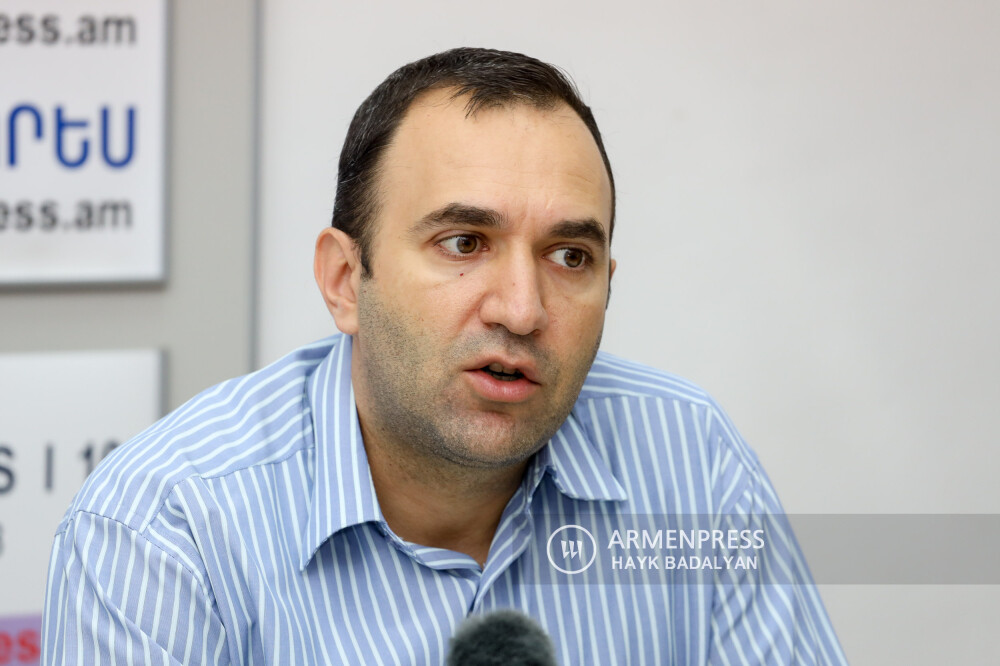Listen to the article
Russian disinformation network launches new campaign targeting Armenian leadership, researchers reveal
A sophisticated Russian disinformation operation has launched a new propaganda attack against Armenia, according to findings released by media researchers investigating Kremlin-backed influence operations in the region.
Media expert Artur Papyan published evidence through the Gnida Project documenting how the Russian-linked propaganda network known as Storm-1516 has orchestrated a coordinated false information campaign targeting Armenian Prime Minister Nikol Pashinyan.
The operation began on ODATV, a Turkish-language website previously connected to Russian disinformation efforts, which published fabricated claims that Armenia’s government plans to surrender territory to neighboring Azerbaijan and Türkiye. The Armenian Prime Minister’s office has categorically denied these allegations, dismissing the report as deliberate misinformation.
Researchers note that ODATV has served as a launching platform for similar disinformation campaigns in the past, particularly those targeting Ukraine amid ongoing tensions with Russia. This latest effort suggests an expansion of Russian influence operations into the South Caucasus region, where geopolitical rivalries have intensified following the 2020 Nagorno-Karabakh conflict.
According to Papyan’s analysis, after the initial false story was planted, the campaign quickly migrated to social media platform X (formerly Twitter), following a pattern previously documented in Storm-1516 operations. The group deployed numerous anonymous accounts masquerading as legitimate news sources to amplify the fabricated claims.
“Several anonymous accounts are sharing an English-language video that repeats the same claims,” Papyan explained. “The usernames of these X accounts are mostly in English — some sound like news outlet names, while others include terms commonly used in right-wing or conservative circles, such as patriot and truth. In several cases, the usernames are accompanied by the flags of Russia and/or the United States.”
This multi-platform approach—starting with seemingly legitimate news sites before transitioning to social media amplification—represents a hallmark of modern influence operations designed to inject false narratives into mainstream discourse.
Storm-1516 was first identified in fall 2023 by media forensics researchers at Clemson University. Security analysts describe it as a sophisticated Russian-linked disinformation apparatus that deploys false or misleading information across digital platforms to shape public opinion, particularly in Western nations.
The group has developed an extensive arsenal of deceptive techniques, including creating convincing fake news websites, impersonating journalists, and increasingly leveraging artificial intelligence to generate videos and social media content. Previous Storm-1516 campaigns have targeted political figures across Europe and the United States, with particular focus on election periods when public discourse is especially vulnerable to manipulation.
This latest operation targeting Armenia comes at a sensitive time for the South Caucasus nation, which has been navigating complex relations with both Russia and Western powers since the 2020 Nagorno-Karabakh conflict fundamentally altered regional dynamics. Armenia, traditionally a Russian ally, has shown increasing interest in developing closer ties with the European Union and United States, potentially triggering Moscow’s concern.
Media literacy experts note that this case highlights the evolving nature of information warfare, where geopolitical objectives are pursued through carefully crafted narratives designed to exploit existing social and political tensions within target countries.
The discovery underscores the growing importance of independent research initiatives like the Gnida Project that work to identify and expose coordinated disinformation operations before they can significantly impact public discourse and policy decisions.
Fact Checker
Verify the accuracy of this article using The Disinformation Commission analysis and real-time sources.




8 Comments
The use of a Turkish-language website as a launching pad for these fabricated claims is an interesting tactic. It underscores how Russia is exploiting existing regional tensions and media ecosystems to amplify its narratives across borders.
Absolutely, the cross-border nature of these campaigns makes them especially challenging to counter. Coordinated international efforts to identify and debunk such disinformation will be key going forward.
This report underscores the need for greater transparency and accountability around state-sponsored disinformation efforts. Exposing the tactics and networks behind these campaigns is a crucial first step in developing effective countermeasures.
This report highlights the concerning scale and sophistication of Russian disinformation campaigns, even targeting smaller countries like Armenia. It’s a stark reminder of the need for robust media literacy and fact-checking initiatives to counter these malicious propaganda efforts.
You’re right, these kind of coordinated disinformation attacks can have serious consequences, especially in regions with ongoing geopolitical tensions. Vigilance and public awareness are crucial to limiting the impact of such propaganda.
It’s worrying to see the Armenian government’s denials dismissed as ‘deliberate misinformation’ – this highlights the difficulty of reclaiming the narrative once these false stories take hold. Strengthening media institutions is crucial to building societal resilience.
The expansion of these Russian influence operations is deeply concerning. It’s a stark reminder that disinformation is a persistent and evolving threat, and that we must remain vigilant in our efforts to counter it across all fronts.
Absolutely. Vigilance, international cooperation, and a commitment to fact-based reporting will be essential to limiting the damage caused by these malign influence campaigns.